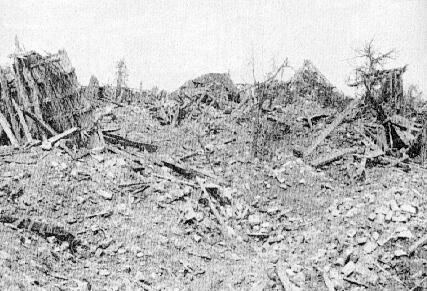

Germany's primary goal in the west was to destroy the French army. This had been the objective of the Schlieffen plan employed in 1914, which was to have been accomplished in six weeks. Instead, a trench stalemate had developed on The Western Front. Both sides had tried for over a year to break out of the stalemate, with no success.
In 1916, Verdun was chosen for a major German offensive. German commander Falkenhayn knew that The French would defend Verdun at all costs and with as many men as possible. Germany would capture Verdun, demoralize the French and score a major breakthrough. Germany would "bleed France white". Falkenhayn also referred to Verdun as "the place of execution" for France and hopefully The French would be battered to the point where they would have to withdraw from the war completely and sue for peace.
Germany's plan was to gather a great deal of artillery for a massive bombardment of the forts in and around Verdun; Germany would also utilize flamethrowers. Verdun was not well defended and the French had actually moved artillery and men elsewhere to places where they were felt they were more urgently needed. There was no reason to suspect there would be a German offensive at Verdun.
The attack was initially planned for Feb. 12th, 1916 but due to bad weather it was not begun until Feb. 21st. At some point the French began to suspect that German forces were amassing near Verdun, and The French began to transfer men and arms to defend Verdun. The Germans met a much stronger French presence than would have been encountered on the 12th. The Germans captured several forts in the initial attack but the French successfully defended Verdun and the offensive was halted. This offensive worked the way most things did on The Western Front. The Germans continued attacking and attacking and as Falkenhayn predicted, the French were ordered to defend Verdun at any cost!
Many have looked back and questioned how The French treated Verdun. Every loss of a fort or of territory was to be re-claimed immediately whether it was prudent to do so at that point, and despite the casualties and loss of life that would be involved. Several towns and forts in and around Verdun changed hands many times, but neither side managed a territorial gain of as much as a mile during the entire battle.
On July 1st, a British counter attack began at The Somme, and Germany was forced to move troops from Verdun to The Somme. Also, Russia opened The Brusilov offensive in the east. German attacks ceased but they fought to hold their ground. It took until December for The French to finally regain all that had been lost in February. Without The Somme and Brusilov, it is doubtful that France could have held Verdun and may have had to bow out of the war completely.
It was predicted that French casualties would be severe and they were, but Germany suffered just as much. Verdun has been called the worst battle of attrition in history. For me it is the most sinister battle in history and one of the darkest moments in Western civilization. It is here that the industrialist and the barbarian fight side by side. The objective of most battles is to defeat the enemy and then take something like cities, oil fields, rich agricultural lands; in ancient (and not too ancient times) the defeated were carried off as slaves. The goal here was to produce as many dead as possible.
Verdun showed what happens when two industrialized nations make industrial war on each other: the killing just went on and on and on. After eight months and a combined casualty list of about 1,000,000 on both sides, including somewhere around 700,000 dead, the battle was over. Most soldiers killed were blown to bits by artillery shells, or gassed to death. A great deal of the bodies were never recovered. Germany had succeeded in bleeding The French, but she had also bled herself just as badly.
The normal "safety" of the trenches did not exist at Verdun. The trenches were destroyed by the heavy bombardments, so there were only pockets remaining of what had been the trenches. The battle was visible for miles because of the artillery bombardments. Verdun was known as "the Furnace".
Verdun lead to no gain in territory, but then again this had not been the goal.